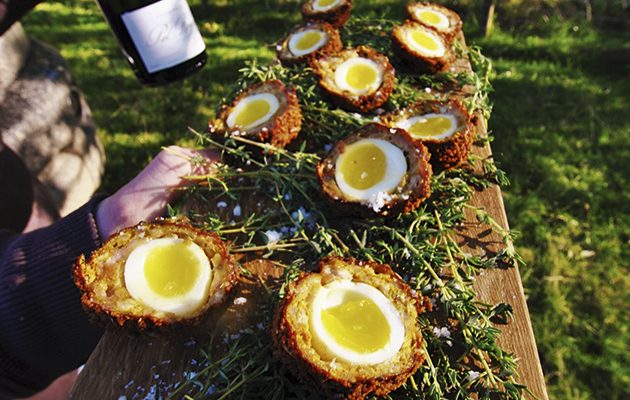You need extra patience and the touch of a fairy for Tom Godber-Ford Moore's pheasant scotch quails eggs, but these moreish morsels are a guaranteed crowd pleaser for shoot elevenses
For a fail-safe crowd pleaser, you can’t go far wrong with scotch eggs. Tom Godber-Ford Moore’s pheasant scotch quails eggs are as delicious as the classics, just with an added gamey twist. You will be hard pressed to find a gun that will turn these down at elevenses.
Whether pocketed for the peg or partner to a pint, the meaty exterior and runny yolk of a scotch egg is difficult to beat. And this moreish morsel is only improved with a gamey twist. Try The Harwood Arms venison scotch egg – a little different and from a Michelin starred restaurant, no less.
PHEASANT SCOTCH QUAILS EGGS
These are another crowd pleaser. The recipe will make 20 eggs but we like to make them with a fairly thin crust. I always lose a few eggs when I’m peeling a soft boil – you need a touch like a fairy – so bear this in mind, but it is infinitely worth the effort.
Makes 20 eggs
- 2 dozen quail eggs
- 4 pheasant breasts, minced
- 300g minced pork
- 1 tbsp chopped rosemary
- 1 clove garlic, crushed
- 1 tbsp celery salt
- 1 tsp black pepper
- 200g dried breadcrumbs
First, put the eggs into a pan of boiling water for exactly 2½ minutes, drain as quickly as you can and place into a pan of cold water. If you want a runny yolk, you have to move fast.
Mix all the remaining ingredients, except the breadcrumbs, together.
Carefully peel the quail eggs and set aside.
Form the pheasant mixture into 20 (or as many eggs as you have left) balls. Flatten out a ball in the centre of your hand and place an egg in the middle, then carefully work the meat around the egg, sealing the edges by pinching them gently at the seam.
Repeat with all the eggs then roll in the dried breadcrumbs. Deep fry for 3-4 minutes until the meat is cooked.
Serve whole or halved but they are definitely best when still warm, if that’s possible.





